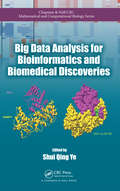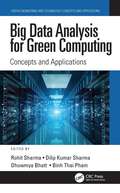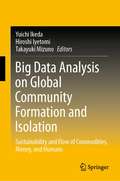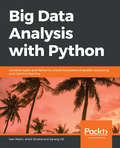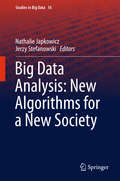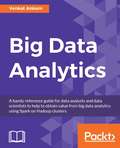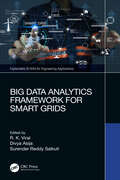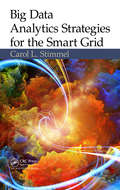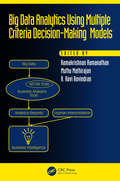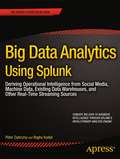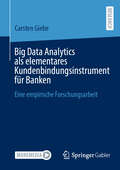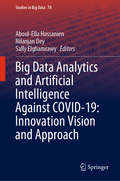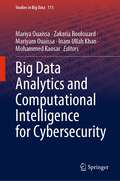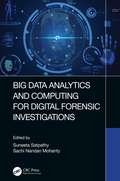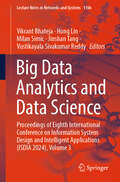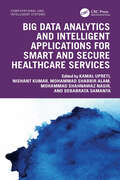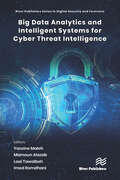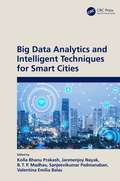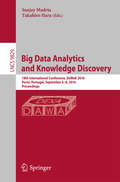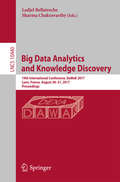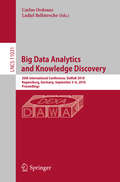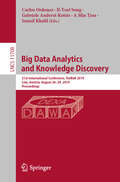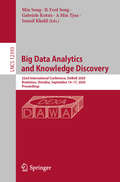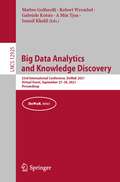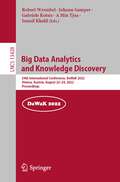- Table View
- List View
Big Data Analysis for Bioinformatics and Biomedical Discoveries (Chapman & Hall/CRC Computational Biology Series)
by Shui Qing YeDemystifies Biomedical and Biological Big Data AnalysesBig Data Analysis for Bioinformatics and Biomedical Discoveries provides a practical guide to the nuts and bolts of Big Data, enabling you to quickly and effectively harness the power of Big Data to make groundbreaking biological discoveries, carry out translational medical research, and implem
Big Data Analysis for Green Computing: Concepts and Applications (Green Engineering and Technology)
by Rohit SharmaThis book focuses on big data in business intelligence, data management, machine learning, cloud computing, and smart cities. It also provides an interdisciplinary platform to present and discuss recent innovations, trends, and concerns in the fields of big data and analytics. Big Data Analysis for Green Computing: Concepts and Applications presents the latest technologies and covers the major challenges, issues, and advances of big data and data analytics in green computing. It explores basic as well as high-level concepts. It also includes the use of machine learning using big data and discusses advanced system implementation for smart cities. The book is intended for business and management educators, management researchers, doctoral scholars, university professors, policymakers, and higher academic research organizations.
Big Data Analysis on Global Community Formation and Isolation: Sustainability and Flow of Commodities, Money, and Humans
by Yuichi Ikeda Hiroshi Iyetomi Takayuki MizunoIn this book, the authors analyze big data on global interdependence caused by the flows of commodities, money, and people, using a network science approach to obtain differing views of globalization and to clarify the facts on isolation of communities. Globalization reduces international economic inequality, i.e., it allows emerging countries to catch up while it increases relative poverty in some advanced countries. How should this trade-off between international and domestic inequalities be resolved? At the same time, the reduction of biocultural diversity caused by globalization needs to be avoided. What kind of change is required in local communities to conserve biocultural diversity? On the issue of commodity flow, research results of the supply-chain network, isolation in industry, and resource flows and stocks are presented in this book. For monetary flow, ownership networks, value-added networks, and profit shifting were studied; and regarding the flow of people, linkage of ethnic groups, immigrant assimilation, and refugees were examined. Based on the resulting view of globalization and isolation, the development of the isolation index using machine learning is discussed. Finally, recommendations for evidence-based policymaking in the United Nations are considered.
Big Data Analysis with Python: Combine Spark and Python to unlock the powers of parallel computing and machine learning
by Ivan MarinThe audience is expected to know basic statistical measurements (mean, median, standard deviation, and so on), some kinds of graphs (line graph, scatter plot, and so on) and have working knowledge of relational databases. Python programming or other programming language experience is required. Having knowledge about distributed systems and/or Hadoop is useful.
Big Data Analysis: New Algorithms for a New Society (Studies in Big Data #16)
by Nathalie Japkowicz Jerzy StefanowskiThis edited volume is devotedto Big Data Analysis from a Machine Learning standpoint as presented by some ofthe most eminent researchers in this area. It demonstrates that Big Data Analysis opens up new researchproblems which were either never considered before, or were only consideredwithin a limited range. In addition to providing methodological discussions onthe principles of mining Big Data and the difference between traditionalstatistical data analysis and newer computing frameworks, this book presentsrecently developed algorithms affecting such areas as business, financialforecasting, human mobility, the Internet of Things, information networks,bioinformatics, medical systems and life science. It explores, through a numberof specific examples, how the study of Big Data Analysis has evolved and how ithas started and will most likely continue to affect society. While the benefitsbrought upon by Big Data Analysis are underlined, the book also discusses someof the warnings that have been issued concerning the potential dangers of BigData Analysis along with its pitfalls and challenges.
Big Data Analytics
by Venkat AnkamA handy reference guide for data analysts and data scientists to help to obtain value from big data analytics using Spark on Hadoop clusters About This Book * This book is based on the latest 2.0 version of Apache Spark and 2.7 version of Hadoop integrated with most commonly used tools. * Learn all Spark stack components including latest topics such as DataFrames, DataSets, GraphFrames, Structured Streaming, DataFrame based ML Pipelines and SparkR. * Integrations with frameworks such as HDFS, YARN and tools such as Jupyter, Zeppelin, NiFi, Mahout, HBase Spark Connector, GraphFrames, H2O and Hivemall. Who This Book Is For Though this book is primarily aimed at data analysts and data scientists, it will also help architects, programmers, and practitioners. Knowledge of either Spark or Hadoop would be beneficial. It is assumed that you have basic programming background in Scala, Python, SQL, or R programming with basic Linux experience. Working experience within big data environments is not mandatory. What You Will Learn * Find out and implement the tools and techniques of big data analytics using Spark on Hadoop clusters with wide variety of tools used with Spark and Hadoop * Understand all the Hadoop and Spark ecosystem components * Get to know all the Spark components: Spark Core, Spark SQL, DataFrames, DataSets, Conventional and Structured Streaming, MLLib, ML Pipelines and Graphx * See batch and real-time data analytics using Spark Core, Spark SQL, and Conventional and Structured Streaming * Get to grips with data science and machine learning using MLLib, ML Pipelines, H2O, Hivemall, Graphx, SparkR and Hivemall. In Detail Big Data Analytics book aims at providing the fundamentals of Apache Spark and Hadoop. All Spark components - Spark Core, Spark SQL, DataFrames, Data sets, Conventional Streaming, Structured Streaming, MLlib, Graphx and Hadoop core components - HDFS, MapReduce and Yarn are explored in greater depth with implementation examples on Spark + Hadoop clusters. It is moving away from MapReduce to Spark. So, advantages of Spark over MapReduce are explained at great depth to reap benefits of in-memory speeds. DataFrames API, Data Sources API and new Data set API are explained for building Big Data analytical applications. Real-time data analytics using Spark Streaming with Apache Kafka and HBase is covered to help building streaming applications. New Structured streaming concept is explained with an IOT (Internet of Things) use case. Machine learning techniques are covered using MLLib, ML Pipelines and SparkR and Graph Analytics are covered with GraphX and GraphFrames components of Spark. Readers will also get an opportunity to get started with web based notebooks such as Jupyter, Apache Zeppelin and data flow tool Apache NiFi to analyze and visualize data. Style and approach This step-by-step pragmatic guide will make life easy no matter what your level of experience. You will deep dive into Apache Spark on Hadoop clusters through ample exciting real-life examples. Practical tutorial explains data science in simple terms to help programmers and data analysts get started with Data Science
Big Data Analytics Framework for Smart Grids (Explainable AI (XAI) for Engineering Applications)
by Surender Reddy Salkuti Divya Asija R. K. ViralThe text comprehensively discusses smart grid operations and the use of big data analytics in overcoming the existing challenges. It covers smart power generation, transmission, and distribution, explains energy management systems, artificial intelligence, and machine learning–based computing. •Presents a detailed state-of-the-art analysis of big data analytics and its uses in power grids. • Describes how the big data analytics framework has been used to display energy in two scenarios including a single house and a smart grid with thousands of smart meters. •Explores the role of the internet of things, artificial intelligence, and machine learning in smart grids. • Discusses edge analytics for integration of generation technologies, and decision-making approaches in detail. • Examines research limitations and presents recommendations for further research to incorporate big data analytics into power system design and operational frameworks. &nb
Big Data Analytics Strategies for the Smart Grid
by Carol L. StimmelA comprehensive data analytics program is the only way utilities will be able to meet the challenges of modern grids with operational efficiency, while reconciling the demands of greenhouse gas legislation, and establishing a meaningful return on investment from smart grid deployments. This book addresses the requirements for applying big data technologies and approaches, including Big Data cybersecurity, to the critical infrastructure that makes up the electrical utility grid.
Big Data Analytics Using Multiple Criteria Decision-Making Models (Operations Research Series)
by Ramakrishnan Ramanathan, Muthu Mathirajan, and A. Ravi RavindranMultiple Criteria Decision Making (MCDM) is a subfield of Operations Research, dealing with decision making problems. A decision-making problem is characterized by the need to choose one or a few among a number of alternatives. The field of MCDM assumes special importance in this era of Big Data and Business Analytics. In this volume, the focus will be on modelling-based tools for Business Analytics (BA), with exclusive focus on the sub-field of MCDM within the domain of operations research. The book will include an Introduction to Big Data and Business Analytics, and challenges and opportunities for developing MCDM models in the era of Big Data.
Big Data Analytics Using Splunk: Deriving Operational Intelligence from Social Media, Machine Data, Existing Data Warehouses, and Other Real-Time Streaming Sources
by Raghu Kodali Peter ZadroznyBig Data Analytics Using Splunk is a hands-on book showing how to process and derive business value from big data in real time. Examples in the book draw from social media sources such as Twitter (tweets) and Foursquare (check-ins). You also learn to draw from machine data, enabling you to analyze, say, web server log files and patterns of user access in real time, as the access is occurring. Gone are the days when you need be caught out by shifting public opinion or sudden changes in customer behavior. Splunk's easy to use engine helps you recognize and react in real time, as events are occurring. Splunk is a powerful, yet simple analytical tool fast gaining traction in the fields of big data and operational intelligence. Using Splunk, you can monitor data in real time, or mine your data after the fact. Splunk's stunning visualizations aid in locating the needle of value in a haystack of a data. Geolocation support spreads your data across a map, allowing you to drill down to geographic areas of interest. Alerts can run in the background and trigger to warn you of shifts or events as they are taking place. With Splunk you can immediately recognize and react to changing trends and shifting public opinion as expressed through social media, and to new patterns of eCommerce and customer behavior. The ability to immediately recognize and react to changing trends provides a tremendous advantage in today's fast-paced world of Internet business. Big Data Analytics Using Splunk opens the door to an exciting world of real-time operational intelligence. Built around hands-on projects Shows how to mine social media Opens the door to real-time operational intelligence
Big Data Analytics als elementares Kundenbindungsinstrument für Banken: Eine empirische Forschungsarbeit
by Carsten GiebeDie vorliegenden Untersuchungen schließen nicht nur eine bestehende Lücke in der akademischen Diskussion zu Big Data Analytics im deutschen Bankwesen, sondern tragen auch zu praktischem Wissen aus verschiedenen Blickwinkeln bei. Erstmalig wurde für Banken in Deutschland der Bezug zwischen dem Modell „Grundsätze der Kundenberatung“ im Zusammenhang mit Big Data Analytics aus der Bankkundenperspektive und der Bankberaterperspektive untersucht. Der Hauptbeitrag dieser Forschung und ihre Originalität bilden Ergebnisse, um den Einsatz von Big Data Analytics als elementares Kundenbindungsinstrument für Banken in Deutschland besser zu verstehen und Richtungen aufzuzeigen, diesen zu nutzen bzw. auszubauen.
Big Data Analytics and Artificial Intelligence Against COVID-19: Innovation Vision and Approach (Studies in Big Data #78)
by Aboul-Ella Hassanien Nilanjan Dey Sally ElghamrawyThis book includes research articles and expository papers on the applications of artificial intelligence and big data analytics to battle the pandemic. In the context of COVID-19, this book focuses on how big data analytic and artificial intelligence help fight COVID-19. The book is divided into four parts. The first part discusses the forecasting and visualization of the COVID-19 data. The second part describes applications of artificial intelligence in the COVID-19 diagnosis of chest X-Ray imaging. The third part discusses the insights of artificial intelligence to stop spread of COVID-19, while the last part presents deep learning and big data analytics which help fight the COVID-19.
Big Data Analytics and Computational Intelligence for Cybersecurity (Studies in Big Data #111)
by Mariya Ouaissa Zakaria Boulouard Mariyam Ouaissa Inam Ullah Khan Mohammed KaosarThis book presents a collection of state-of-the-art artificial intelligence and big data analytics approaches to cybersecurity intelligence. It illustrates the latest trends in AI/ML-based strategic defense mechanisms against malware, vulnerabilities, cyber threats, as well as proactive countermeasures. It also introduces other trending technologies, such as blockchain, SDN, and IoT, and discusses their possible impact on improving security. The book discusses the convergence of AI/ML and big data in cybersecurity by providing an overview of theoretical, practical, and simulation concepts of computational intelligence and big data analytics used in different approaches of security. It also displays solutions that will help analyze complex patterns in user data and ultimately improve productivity. This book can be a source for researchers, students, and practitioners interested in the fields of artificial intelligence, cybersecurity, data analytics, and recent trends of networks.
Big Data Analytics and Computing for Digital Forensic Investigations
by Suneeta Satpathy Sachi Nandan MohantyDigital forensics has recently gained a notable development and become the most demanding area in today’s information security requirement. This book investigates the areas of digital forensics, digital investigation and data analysis procedures as they apply to computer fraud and cybercrime, with the main objective of describing a variety of digital crimes and retrieving potential digital evidence. Big Data Analytics and Computing for Digital Forensic Investigations gives a contemporary view on the problems of information security. It presents the idea that protective mechanisms and software must be integrated along with forensic capabilities into existing forensic software using big data computing tools and techniques. Features Describes trends of digital forensics served for big data and the challenges of evidence acquisition Enables digital forensic investigators and law enforcement agencies to enhance their digital investigation capabilities with the application of data science analytics, algorithms and fusion technique This book is focused on helping professionals as well as researchers to get ready with next-generation security systems to mount the rising challenges of computer fraud and cybercrimes as well as with digital forensic investigations. Dr Suneeta Satpathy has more than ten years of teaching experience in different subjects of the Computer Science and Engineering discipline. She is currently working as an associate professor in the Department of Computer Science and Engineering, College of Bhubaneswar, affiliated with Biju Patnaik University and Technology, Odisha. Her research interests include computer forensics, cybersecurity, data fusion, data mining, big data analysis and decision mining. Dr Sachi Nandan Mohanty is an associate professor in the Department of Computer Science and Engineering at ICFAI Tech, ICFAI Foundation for Higher Education, Hyderabad, India. His research interests include data mining, big data analysis, cognitive science, fuzzy decision-making, brain–computer interface, cognition and computational intelligence.
Big Data Analytics and Data Science: Proceedings of Eighth International Conference on Information System Design and Intelligent Applications (ISDIA 2024), Volume 3 (Lecture Notes in Networks and Systems #1106)
by Vikrant Bhateja Hong Lin Milan Simic Jinshan Tang Vustikayala Sivakumar ReddyThis book presents a collection of high-quality, peer-reviewed research papers from the 8th International Conference on Information System Design and Intelligent Applications (ISDIA 2024), held in Dubai, UAE, from 3 - 4 January 2024. It covers a wide range of topics in computer science and information technology, including data mining and data warehousing, high-performance computing, parallel and distributed computing, computational intelligence, soft computing, big data, cloud computing, grid computing, cognitive computing, and information security.
Big Data Analytics and Intelligent Applications for Smart and Secure Healthcare Services (Computational and Intelligent Systems)
by Debabrata Samanta Kamal Upreti Nishant Kumar Mohammad Shabbir Alam Mohammad Shahnawaz NasirThe book provides a comprehensive discussion for utilizing computational models such as artificial neural networks, agent-based models, and decision field theory, for reliability engineering. It further presents optimization solutions for smart and secure healthcare services. The text showcases how to predict the failure and repair rates of healthcare subsystems using computational intelligence.This book: Explores how data-driven methodologies and advanced computational intelligence are revolutionizing the healthcare industry, promoting efficiency, accessibility, and sustainability Highlights the pivotal role that big data analytics plays in harnessing vast amounts of patient records, clinical information, and real-time medical data to provide timely insights for healthcare professionals and policymakers Discusses the integration of artificial intelligence and machine learning techniques in healthcare, with a focus on revolutionizing disease detection, treatment planning, and resource allocation Lays the foundation for developing sustainable healthcare systems that are adaptable to long-term challenges, such as population growth, emerging diseases, and resource constraints Covers computational intelligence techniques, like fuzzy logic, neural networks, and evolutionary computations, emphasizing their role in solving complex, data-driven healthcare problems Includes topics like data management, visualization, protection, and complex adaptive systems, as well as hybrid computational intelligence techniques for synergistic problem-solving strategies This volume will serve as an ideal text for senior undergraduates, graduate students, and academic researchers in fields including electrical engineering, electronics and communications engineering, computer engineering, and mathematics.
Big Data Analytics and Intelligent Systems for Cyber Threat Intelligence
by Imed Romdhani Yassine Maleh Mamoun Alazab Loai TawalbehIn recent years, a considerable amount of effort has been devoted to cyber-threat protection of computer systems which is one of the most critical cybersecurity tasks for single users and businesses since even a single attack can result in compromised data and sufficient losses. Massive losses and frequent attacks dictate the need for accurate and timely detection methods. Current static and dynamic methods do not provide efficient detection, especially when dealing with zero-day attacks. For this reason, big data analytics and machine intelligencebased techniques can be used. This book brings together researchers in the field of big data analytics and intelligent systems for cyber threat intelligence CTI and key data to advance the mission of anticipating, prohibiting, preventing, preparing, and responding to internal security. The wide variety of topics it presents offers readers multiple perspectives on various disciplines related to big data analytics and intelligent systems for cyber threat intelligence applications. Technical topics discussed in the book include:• Big data analytics for cyber threat intelligence and detection• Artificial intelligence analytics techniques• Real-time situational awareness• Machine learning techniques for CTI• Deep learning techniques for CTI• Malware detection and prevention techniques• Intrusion and cybersecurity threat detection and analysis• Blockchain and machine learning techniques for CTI
Big Data Analytics and Intelligent Techniques for Smart Cities
by Valentina Emilia Balas Janmenjoy Nayak Sanjeevikumar Padmanaban Kolla Bhanu Prakash B. T. P. MadhavBig Data Analytics and Intelligent Techniques for Smart Cities covers fundamentals, advanced concepts, and applications of big data analytics for smart cities in a single volume. This comprehensive reference text discusses big data theory modeling and simulation for smart cities and examines case studies in a single volume. The text discusses how to develop a smart city and state-of-the-art system design, system verification, real-time control and adaptation, Internet of Things, and testbeds. It covers applications of smart cities as they relate to smart transportation/connected vehicle (CV) and intelligent transportation systems (ITS) for improved mobility, safety, and environmental protection. It will be useful as a reference text for graduate students in different areas including electrical engineering, computer science engineering, civil engineering, and electronics and communications engineering.Features: Technologies and algorithms associated with the application of big data for smart cities Discussions on big data theory modeling and simulation for smart cities Applications of smart cities as they relate to smart transportation and intelligent transportation systems (ITS) Discussions on concepts including smart education, smart culture, and smart transformation management for social and societal changes
Big Data Analytics and Knowledge Discovery: 18th International Conference, DaWaK 2016, Porto, Portugal, September 6-8, 2016, Proceedings (Lecture Notes in Computer Science #9829)
by Sanjay Madria Takahiro HaraThis book constitutes the refereed proceedings of the 17th International Conference on Data Warehousing and Knowledge Discovery, DaWaK 2015, held in Valencia, Spain, September 2015. The 31 revised full papers presented were carefully reviewed and selected from 90 submissions. The papers are organized in topical sections similarity measure and clustering; data mining; social computing; heterogeneos networks and data; data warehouses; stream processing; applications of big data analysis; and big data.
Big Data Analytics and Knowledge Discovery: 19th International Conference, DaWaK 2017, Lyon, France, August 28–31, 2017, Proceedings (Lecture Notes in Computer Science #10440)
by Ladjel Bellatreche and Sharma ChakravarthyThis book constitutes the refereed proceedings of the 19th International Conference on Big Data Analytics and Knowledge Discovery, DaWaK 2017, held in Lyon, France, in August 2017.The 24 revised full papers and 11 short papers presented were carefully reviewed and selected from 97 submissions. The papers are organized in the following topical sections: new generation data warehouses design; cloud and NoSQL databases; advanced programming paradigms; non-functional requirements satisfaction; machine learning; social media and twitter analysis; sentiment analysis and user influence; knowledge discovery; and data flow management and optimization.
Big Data Analytics and Knowledge Discovery: 20th International Conference, DaWaK 2018, Regensburg, Germany, September 3–6, 2018, Proceedings (Lecture Notes in Computer Science #11031)
by Ladjel Bellatreche Carlos OrdonezThis book constitutes the refereed proceedings of the 20th International Conference on Big Data Analytics and Knowledge Discovery, DaWaK 2018, held in Regensburg, Germany, in September 2018.The 13 revised full papers and 17 short papers presented were carefully reviewed and selected from 76 submissions. The papers are organized in the following topical sections: Graph analytics; case studies; classification and clustering; pre-processing; sequences; cloud and database systems; and data mining.
Big Data Analytics and Knowledge Discovery: 21st International Conference, DaWaK 2019, Linz, Austria, August 26–29, 2019, Proceedings (Lecture Notes in Computer Science #11708)
by Ismail Khalil A Min Tjoa Il-Yeol Song Carlos Ordonez Gabriele Anderst-KotsisThis book constitutes the refereed proceedings of the 21st International Conference on Big Data Analytics and Knowledge Discovery, DaWaK 2019, held in Linz, Austria, in September 2019. The 12 full papers and 10 short papers presented were carefully reviewed and selected from 61 submissions. The papers are organized in the following topical sections: Applications; patterns; RDF and streams; big data systems; graphs and machine learning; databases.
Big Data Analytics and Knowledge Discovery: 22nd International Conference, DaWaK 2020, Bratislava, Slovakia, September 14–17, 2020, Proceedings (Lecture Notes in Computer Science #12393)
by Min Song Ismail Khalil A Min Tjoa Il-Yeol Song Gabriele KotsisThe volume LNCS 12393 constitutes the papers of the 22nd International Conference Big Data Analytics and Knowledge Discovery which will be held online in September 2020. The 15 full papers presented together with 14 short papers plus 1 position paper in this volume were carefully reviewed and selected from a total of 77 submissions. This volume offers a wide range to following subjects on theoretical and practical aspects of big data analytics and knowledge discovery as a new generation of big data repository, data pre-processing, data mining, text mining, sequences, graph mining, and parallel processing.
Big Data Analytics and Knowledge Discovery: 23rd International Conference, DaWaK 2021, Virtual Event, September 27–30, 2021, Proceedings (Lecture Notes in Computer Science #12925)
by Ismail Khalil A Min Tjoa Robert Wrembel Matteo Golfarelli Gabriele KotsisThis volume LNCS 12925 constitutes the papers of the 23rd International Conference on Big Data Analytics and Knowledge Discovery, held in September 2021. Due to COVID-19 pandemic it was held virtually. The 12 full papers presented together with 15 short papers in this volume were carefully reviewed and selected from a total of 71 submissions.The papers reflect a wide range of topics in the field of data integration, data warehousing, data analytics, and recently big data analytics, in a broad sense. The main objectives of this event are to explore, disseminate, and exchange knowledge in these fields.
Big Data Analytics and Knowledge Discovery: 24th International Conference, DaWaK 2022, Vienna, Austria, August 22–24, 2022, Proceedings (Lecture Notes in Computer Science #13428)
by Ismail Khalil A Min Tjoa Johann Gamper Robert Wrembel Gabriele KotsisThis volume LNCS 13428 constitutes the papers of the 24 th International Conference on Big Data Analytics and Knowledge Discovery, held in August 2022 in Vienna, Austria. The 12 full papers presented together with 12 short papers in this volume were carefully reviewed and selected from a total of 57 submissions. The papers reflect a wide range of topics in the field of data integration, data warehousing, data analytics, and recently big data analytics, in a broad sense. The main objectives of this event are to explore, disseminate, and exchange knowledge in these fields.
